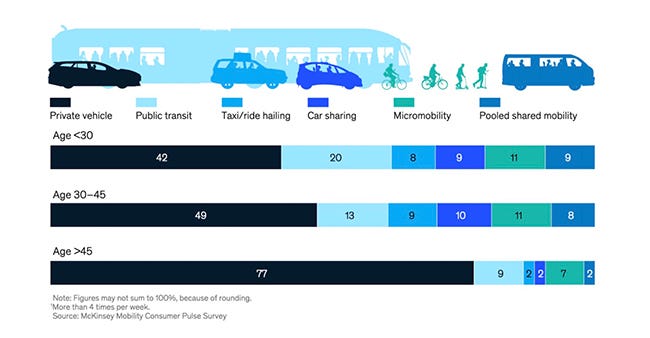Have No Car, Will Travel: Gen Z Consumers Upend Mobility Market
McKinsey study reveals Europe’s Gen Z cohort is more likely to use sustainable and shared modes of mobility.
June 12, 2023

Younger drivers in Europe have distinct mobility preferences, opting more often than older generations for public transit and shared mobility modes over private vehicles, according to a survey by senior partner Max Flötotto and colleagues at McKinsey & Co. Europe’s Gen Z consumers also indicate they plan to use sustainable mobility modes, such as car sharing, more frequently.
Changing the rules of the mobility game
Like many generations before it, Gen Z doesn’t always follow the rules. For young drivers who still require a private vehicle, the types of cars they want to own, as well as how they want to own or access them, are fundamentally different from the preferences of their ancestors.
|
Car ownership doesn't appeal to Gen Z like it did for previous generations. Shared mobility options are an increasingly attractive alternative. |
As part of its regular McKinsey Mobility Consumer Pulse Survey, the consulting firm asked more than 4,000 customers in France, Germany, and the United Kingdom how they see the future of mobility. The survey found that using multiple transportation modes is becoming more popular, from the rise of ride hailing and car sharing to scooter rentals. An important part of this investigation also involved understanding Gen Z’s preferred modes of transportation.
Reframing private car ownership
One notable insight from the study was that, while private-car usage dominates today’s overall mobility mix for older generations, mobility is more multimodal among young people. Public transit and micromobility usage are more popular with younger consumers, who are more flexible and often opt for shared and sustainable mobility modes. Looking ahead, consumers say they are moving toward reducing their private-car reliance and adding more shared-mobility alternatives into the mix. The effect appears most pronounced for micromobility offerings and public transit.
One small electric car, please
Nearly 55% of Gen Z consumers are open to sharing their private vehicles with others. Gen Zers also know the type of car they want. How they want to use their vehicle is distinct from other age groups, as well. Their preferences are:
Fully electric vehicles — the next car is electric for one out of two Gen Z customers in Europe.
Smaller cars — compact vehicles and even smaller minimobility options are preferred by 64% of Gen Zers versus about 50% across all other age groups.
Flexible ownership — leasing is the strongest-growing form of ownership.
Another key insight revealed clear distinctions between Gen Z and other groups, particularly when it comes to purchasing considerations:
Design and innovative technologies get their attention. Safety, advanced driver assistance systems (ADAS), multimedia, and digital technology are the most mentioned considerations when choosing a vehicle.
Gen Z is more price conscious. The purchase price is the top buying factor for one out of two Gen Z buyers.
More than half of Gen Z buyers would like to start an online car shopping journey based on their budget considerations. Getting a quote and securing up-front vehicle financing online before choosing a specific car are among the top three disruptions to the car purchasing experience today.
About the Author(s)
You May Also Like




